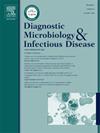Revolutionizing clinical laboratories: The impact of artificial intelligence in diagnostics and patient care
IF 2.1
4区 医学
Q3 INFECTIOUS DISEASES
Diagnostic microbiology and infectious disease
Pub Date : 2025-02-04
DOI:10.1016/j.diagmicrobio.2025.116728
引用次数: 0
Abstract
Introduction
The integration of artificial intelligence (AI) is fundamentally transforming clinical laboratories, significantly improving diagnostic precision and operational effectiveness in the fields of pathology, microbiology, and biochemistry. This evolution holds great promise for advancing patient care and enhancing disease management strategies.
Methodology
A comprehensive literature review was performed using established databases, including Google Scholar, Embase, Science Direct, Scopus, and PubMed. Recent studies published between 2020 and 2024 were sourced using focused keywords related to AI's application in clinical laboratory settings. The inclusion criteria prioritized peer-reviewed articles that contributed to innovations in diagnostic methodologies and operational efficiency. A thematic analysis was conducted to collate findings regarding AI's impact across the preanalytical, analytical, and postanalytical phases of laboratory work.
Discussion
AI significantly enhances various laboratory processes, such as histopathology, immunohistochemistry, and microbiological diagnostics. Notable applications include workflow automation, detailed analysis of biomarker data, and real-time processing to facilitate clinical decision-making. However, the benefits of AI come with challenges, including concerns about data integrity, ethical implications, and potential biases in algorithms, requiring careful management as AI becomes more integrated into clinical practice.
Conclusion
The future of clinical laboratories is poised for increased automation and the incorporation of AI and IoT technologies. While these advancements offer the potential for improved healthcare outcomes through greater accuracy and efficiency, evolving ethical and legal frameworks are crucial to address issues related to data privacy and accountability of algorithms. Ongoing adaptation and exploration of AI applications are vital to fully harnessing its capabilities in diagnostics.
求助全文
约1分钟内获得全文
求助全文
来源期刊
CiteScore
5.30
自引率
3.40%
发文量
149
审稿时长
56 days
期刊介绍:
Diagnostic Microbiology and Infectious Disease keeps you informed of the latest developments in clinical microbiology and the diagnosis and treatment of infectious diseases. Packed with rigorously peer-reviewed articles and studies in bacteriology, immunology, immunoserology, infectious diseases, mycology, parasitology, and virology, the journal examines new procedures, unusual cases, controversial issues, and important new literature. Diagnostic Microbiology and Infectious Disease distinguished independent editorial board, consisting of experts from many medical specialties, ensures you extensive and authoritative coverage.

 求助内容:
求助内容: 应助结果提醒方式:
应助结果提醒方式:


